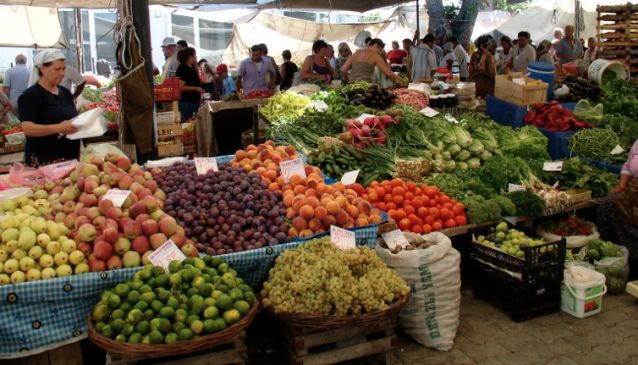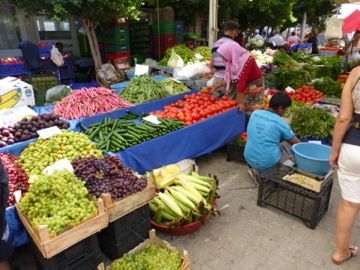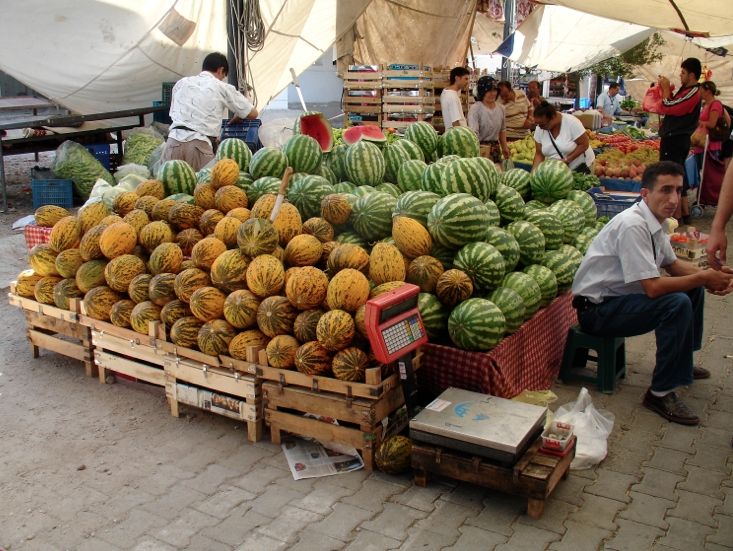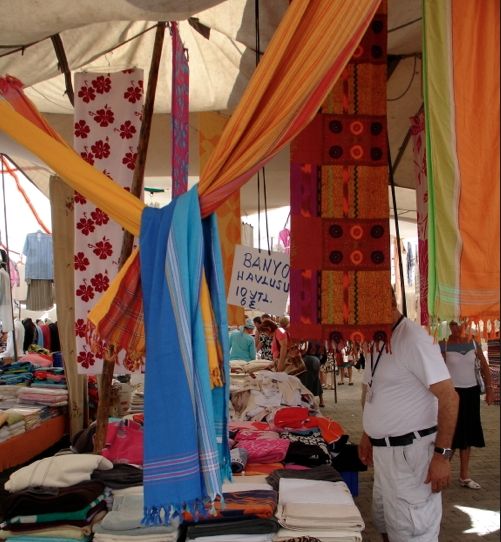Your Guide to How the Locals Live

In Bodrum, Turkey the local name is "pazaar" and it is a type of "expanded" farmers' market. An overflowing delight to th senses, it's basically where the local entrepreneurs sell their goods. All the food supplies you will need for the week can be obtained there for very reasonable prices, and you will be certain to discover what succulent treat is currently in season--maybe heavenly peaches or the famous Malatya apricots, as is in late July. I was thrilled in May to find bushel baskets of Morel mushrooms--yes, that's what I said, Morels!
To wander through the produce section teaches you much about the way of life here and interacting with the sellers is all good fun. Many stalls have samples out for you to taste, but if they do not, you can always ask by simply pointing to your tongue.
The local fare is not only an amazing selection of fruits and begetables, but also mountain staples, such as unique herbs, spices, cheeses or honey. If you carefully examine the various stalls, you will see those that look like a local villager's versus those that are trucking in products; we always buy from the smaller, more local ones.
Many stalls have prepared jars of homemade goodies for sale, just the same as they use in their kitchens. You will see sauces, marmalades, jams, preserved fruits and vegetables all made in family traditions. These women work hard making such authentic treats and sell them on market day for small prices.
For something locally special, get a jar of "biber salçası" -- a thick paste made of red chii peppers , which can be used in nearly everything you cook to add intense mediterranean flavor; be careful, though, this wonder comes in both hot (aci) and mild (tatli) versions and is heavily salted. My favorite is a blend made with tomatoes, "biber-dolmate salcasi". These keep forever in the fridge and make a great gift.
A very special note needs to be made here: there is NO better place to sample and buy CHEESE/ BUTTER/ YOGHURT/ OLIVES than at a local village pazaar.
Why? Because of the following:

Yalikavak Market, Thursdays
All year long the pazaar keeps us in fresh foods. Here is a list of some of our local, seasonal favorites:
January/February give us Bodrum mandalinas--an incredibly sweet tangerine, prized by all as the BEST for marmalades. Lemons and oranges follow soon after.
March/April/May greens appear, such as Pazı (chard) , spanak (spinach), and semizotu (purslane), as does an ugly fruit with many rust-spots, apricot-like, which is so smooth and delicious, just below the peel--called "Malta Eriği" (Fresch name is "Nesla"). Oh, too...at this time fans wait for a highly-valued small, green plum, called "yesil erik")
June/July --all things are going full on, but particulary special to this time are lots of different berries. We think you hve to try the huge, blackberry type called "dut". "Dut" are also boiled down into a syrup (called pekmez) made from an age-old recipe and used as a natural sweetener throughout Turkey. You can by that all summer long.
August/September bring in luscious peaches and figs. and at the end of fall the most amazing fruit called "horma" is here for a very quick period. It looks like a flatter, yellow-orange tomato, but is sweet and jelly-like inside. With these distant members of the date family, the riper the better for if eaten too soon, they have a puckering, ashy quality. To eat them, get over something, as for sure they will drip a lot...cut in half and use a spoon to dig out one delicious spoonful at a time. Yum!
Also the later fall brings many cabbages and root vegetables; the locals ferment mixtures of these in glass jars, making a cross between pickles and sourkraut, called Tursu. The Tursu makers of the families (men or women) pride themselves on their own special touches.
October/November/December is all about preserved foods made from summer harvests, yet some greens and cabbages continue on into winter here. Now is when to buy the sweetest nut meats as well. Almpnds, hazelnuts, and walnuts are the finest found anywhere. For a special almond, we recommend fresh ones from Dacta, just a tad bit sweeter..

Yalikavak Market
Additional to foods, pazaars always have some clothes, dishes, curtains, tablecloths, towels, shoes, carpets, hair accessories, and even camel supplies. My two very favorite gifts to take back to the states are copper camel bells and lace doilies, both found in any pazaar.
Note: In high season, several tour companies take busloads of people to tour the bigger pazaars and usually arrive about 12-1pm. Better to go before then..better for your nerves AND better for your pocket's bottomline. Never be timid about making a resonable offer when buying items...our advice is to add it up in your head ( or take the amount the seller is asking for) add another item or two to the total and round down a couple liras or more to make an offer. Most likely IF you have the correct change, they will take it.

Yalikavak Market
Market day and location:
If you’re asking the locals for directions to the Market – ask for the Pazaar.